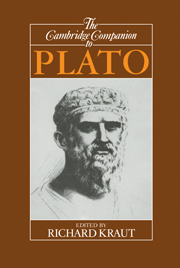Book contents
- Frontmatter
- 1 Introduction to the study of Plato
- 2 Plato
- 3 Stylometry and chronology
- 4 Socrates and the early dialogues
- 5 Mathematical method and philosophical truth
- 6 Inquiry in the Meno
- 7 Plato and Greek religion
- 8 Platonic love
- 9 Plato's metaphysical epistemology
- 10 The defense of justice in Plato's Republic
- 11 Plato on poetic creativity
- 12 Good-bye to the Third Man
- 13 Plato's Sophist on false statements
- 14 Disintegration and restoration
- 15 Plato's later political thought
- Bibliography
- Index
15 - Plato's later political thought
Published online by Cambridge University Press: 28 May 2006
- Frontmatter
- 1 Introduction to the study of Plato
- 2 Plato
- 3 Stylometry and chronology
- 4 Socrates and the early dialogues
- 5 Mathematical method and philosophical truth
- 6 Inquiry in the Meno
- 7 Plato and Greek religion
- 8 Platonic love
- 9 Plato's metaphysical epistemology
- 10 The defense of justice in Plato's Republic
- 11 Plato on poetic creativity
- 12 Good-bye to the Third Man
- 13 Plato's Sophist on false statements
- 14 Disintegration and restoration
- 15 Plato's later political thought
- Bibliography
- Index
Summary
Does Plato have a “later” political theory, as distinct from an earlier? It is certainly easy to suppose so. Read the Republic and you confront the most radical political system ever devised. Plato's key argument is that ruling a state is or should be a skill, based on precise knowledge of certain suprasensible, eternal, and unchanging realities called Forms [ideai], notably those of the social and political virtues, but also those of the rest of reality. On the strength of such insight, the rulers of Callipolis (“Splendid City”), a highly trained cadre of Guardians, or Philosopher-Kings, exercise direct and total political control; and lawmaking is accordingly treated by Plato in a decidedly offhand manner, as a humdrum business on which the Guardians will spend little time.
If you are by now gasping with astonishment or even indignation at the audacity of these proposals, you have every justification; for at first sight Plato's thought seems almost unintelligible. For what are Forms, and why ought they to have such a drastic effect on practical politics? The explanation, though full of philosophical problems that cannot be explored here, can be stated quite briefly. A Form, say of virtue, is the essence of virtue, what it really is, as distinct from the individual things or actions or people that instantiate it in this world; for they only share in the Form of Virtue in varying degrees; they are not Virtue Itself. Now the Greek word usually translated “virtue” is in fact better rendered by “excellence” - excellence for something.
- Type
- Chapter
- Information
- The Cambridge Companion to Plato , pp. 464 - 492Publisher: Cambridge University PressPrint publication year: 1992
- 3
- Cited by

